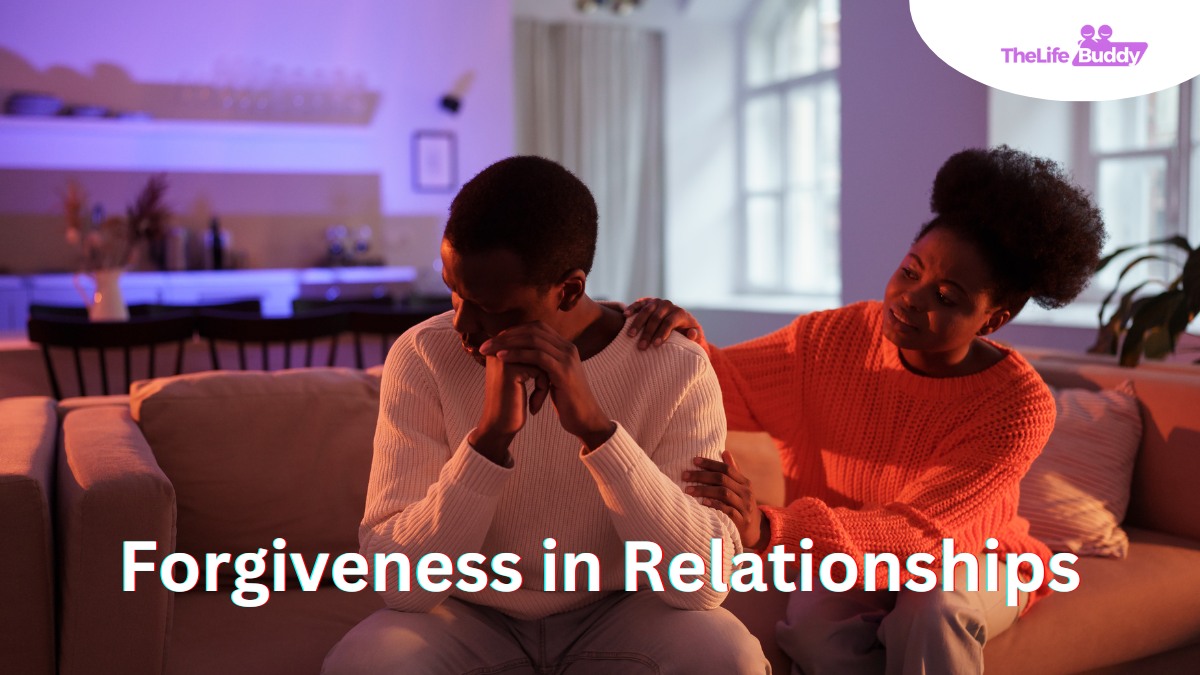What is the Power of Forgiveness in Relationships?

In relationships, navigating the stormy waters of conflicts, misunderstandings, and hurt feelings is a journey every couple embarks on. Despite the deep love and affection that bind partners together, disagreements are inevitable.
According to a study conducted by the American Psychological Association, over 40% of married couples in the United States experience high levels of conflict, indicating a widespread challenge in maintaining harmonious relationships.
The data underscores a universal truth: that within the complexity of human interactions, friction is bound to arise. Yet, amidst these trials, a powerful tool emerges, one that can transform turmoil into peace, and estrangement into closeness: forgiveness.
The Challenge of Unresolved Conflict

Imagine a scenario where one partner forgets an anniversary, an act which may seem minor but can cause significant emotional distress. The hurt partner might harbor resentment, leading to a build-up of silent grievances.
Over time, these accumulated hurts can create a chasm, widening with every unaddressed issue. This is where the cycle of conflict intensifies, leaving both partners feeling misunderstood and alone.
Research indicates that unresolved conflicts can lead to decreased relationship satisfaction and increased emotional distress. A study published in the "Journal of Marriage and Family" found that couples who fail to resolve their conflicts experience a decline in marital happiness over time.
The consequences of letting resentments fester are clear: they not only dampen the joy in a relationship but can also erode the very foundation of trust and intimacy that it's built on.
The Transformative Power of Forgiveness
Forgiveness is not merely about saying "I forgive you" after an apology. It is a profound process of letting go of the need for retribution and releasing the grip of past hurts. This doesn't mean forgetting or condoning the action that caused the pain. Rather, it's about moving beyond the bitterness and resentment to rebuild a sense of trust and mutual respect.
The power of forgiveness in relationships lies in its ability to act as a bridge over troubled waters. It facilitates a return to emotional closeness and understanding, allowing couples to navigate their imperfections with compassion and empathy. Studies have shown that forgiveness is linked to higher relationship satisfaction, emotional well-being, and resilience in facing future challenges. By choosing to forgive, partners can create a space for growth and healing, laying the groundwork for a stronger, more enduring connection.
The Role of Communication in Facilitating Forgiveness
Effective communication plays a crucial role in the process of forgiveness. It involves expressing feelings of hurt and disappointment in a way that is honest yet respectful. This open dialogue creates an opportunity for understanding the other's perspective, intentions, and feelings. It's about creating a safe space where vulnerabilities can be shared without fear of judgment, and where empathy and active listening pave the way for reconciliation.
In fostering forgiveness, it's also essential to acknowledge one's own role in the conflict. This introspection can lead to a deeper understanding of the dynamics at play and pave the way for mutual forgiveness. Through this shared journey, couples can learn valuable lessons about their relationship, themselves, and how to better navigate future disagreements.
Forgiveness as a Choice and a Commitment

Forgiveness is a choice, a conscious decision to let go of grievances for the sake of one's emotional health and the health of the relationship. It requires a commitment to healing and moving forward, together. This doesn't mean that the process is easy or instantaneous. In fact, forgiveness can be a challenging and emotionally taxing journey. However, the decision to embark on this path is a powerful testament to the strength of the bond between partners.
The act of forgiving is also a commitment to growth and positive change. It involves setting boundaries and expectations to prevent future hurts. By learning from past mistakes, couples can strengthen their relationship, making it more resilient in the face of adversity.
The Ripple Effect of Forgiveness
The impact of forgiveness extends beyond the individuals involved; it has a ripple effect that can influence the overall health and happiness of the relationship. Couples who practice forgiveness report feeling more connected, supportive, and satisfied with their relationship. This positive shift can enhance communication, deepen intimacy, and foster a greater sense of partnership.
Furthermore, forgiveness can serve as a model for resolving conflicts in a constructive manner. It teaches important lessons about empathy, compassion, and the value of maintaining a healthy, loving relationship despite the challenges that may arise.
In the quiet of the night, where whispers heal, Lies a power profound, both gentle and real. Forgiveness, a balm for the wounds we conceal, A bridge to rebuild, to mend and to seal.
In love’s tender dance, missteps we all make, Hearts sometimes falter, and sometimes they break. But the power of pardon, a light in the dark, Can rekindle the fire, re-spark the spark.
Forgiveness, a gift, both given and received, It’s the breath of fresh air, when burdens are relieved. A hand held out, a heart open wide, A promise to stand together, side by side.
It’s the whisper that says, “I see your pain,” And the courage to let go, to break the chain. For in the act of forgiving, we find our release, A path to redemption, a journey to peace.
It’s not forgetting, but rather embracing, The lessons we've learned, the growth that’s replacing. It’s the strength to move forward, past the regret, In the garden of love, where forgiveness is set.
So let us cherish this power, so tender yet strong, For it heals every rift, rights every wrong. In the tapestry of life, it’s the thread that mends, The beautiful essence where every love story ends.
In a Nutshell
The power of forgiveness in relationships is transformative. It offers a pathway out of the cycle of conflict and resentment, leading to healing, growth, and a deeper connection. By choosing to forgive, couples embrace the complexity of their relationship, acknowledging that perfection is unattainable but growth and understanding are always within reach.
Forgiveness is not just an act of letting go; it's a commitment to love, respect, and cherish one another, flaws and all. In the end, the strength of a relationship is not measured by its absence of conflicts, but by its ability to overcome them, together.


